Cell Cycle Antibodies 1
Anti-CDK6 Antibody (CAB16357)
- SKU:
- CAB16357
- Product Type:
- Antibody
- Reactivity:
- Human
- Reactivity:
- Mouse
- Reactivity:
- Rat
- Host Species:
- Rabbit
- Isotype:
- IgG
- Antibody Type:
- Polyclonal Antibody
- Research Area:
- Cell Cycle
Description
| Antibody Name: | Anti-CDK6 Antibody |
| Antibody SKU: | CAB16357 |
| Antibody Size: | 20uL, 50uL, 100uL |
| Application: | WB IHC IF |
| Reactivity: | Human, Mouse, Rat |
| Host Species: | Rabbit |
| Immunogen: | Recombinant fusion protein containing a sequence corresponding to amino acids 1-326 of human CDK6 (NP_001250.1). |
| Application: | WB IHC IF |
| Recommended Dilution: | WB 1:500 - 1:2000 IHC 1:50 - 1:200 IF 1:50 - 1:200 |
| Reactivity: | Human, Mouse, Rat |
| Positive Samples: | HeLa, Jurkat, K-562 |
| Immunogen: | Recombinant fusion protein containing a sequence corresponding to amino acids 1-326 of human CDK6 (NP_001250.1). |
| Purification Method: | Affinity purification |
| Storage Buffer: | Store at -20'C. Avoid freeze / thaw cycles. Buffer: PBS with 0.02% sodium azide, 50% glycerol, pH7.3. |
| Isotype: | IgG |
| Sequence: | MEKD GLCR ADQQ YECV AEIG EGAY GKVF KARD LKNG GRFV ALKR VRVQ TGEE GMPL STIR EVAV LRHL ETFE HPNV VRLF DVCT VSRT DRET KLTL VFEH VDQD LTTY LDKV PEPG VPTE TIKD MMFQ LLRG LDFL HSHR VVHR DLKP QNIL VTSS GQIK LADF GLAR IYSF QMAL TSVV VTLW YRAP EVLL QSSY ATPV DLWS VGCI FAEM FRRK PLFR GSSD VDQL GKIL DVIG LPGE EDWP RDVA LPRQ AFHS KSAQ PIEK FVTD IDEL GKDL LLKC LTFN PAKR ISAY SALS HPYF QDLE RCKE NLDS HLPP SQNT SELN TA |
| Gene ID: | 1021 |
| Uniprot: | Q00534 |
| Cellular Location: | Cell projection, Cytoplasm, Nucleus, centrosome, cytoskeleton, microtubule organizing center, ruffle |
| Calculated MW: | 36kDa |
| Observed MW: | 37kDa |
| Synonyms: | CDK6, MCPH12, PLSTIRE |
| Background: | The protein encoded by this gene is a member of the cyclin-dependent protein kinase (CDK) family. CDK family members are highly similar to the gene products of Saccharomyces cerevisiae cdc28, and Schizosaccharomyces pombe cdc2, and are known to be important regulators of cell cycle progression. This kinase is a catalytic subunit of the protein kinase complex that is important for cell cycle G1 phase progression and G1/S transition. The activity of this kinase first appears in mid-G1 phase, which is controlled by the regulatory subunits including D-type cyclins and members of INK4 family of CDK inhibitors. This kinase, as well as CDK4, has been shown to phosphorylate, and thus regulate the activity of, tumor suppressor protein Rb. Expression of this gene is up-regulated in some types of cancer. Multiple alternatively spliced variants, encoding the same protein, have been identified. |
| UniProt Protein Function: | CDK6: a protein kinase of the CDK family. Important for cell cycle G1 phase progression and G1/S transition. The activity of this kinase first appears in mid-G1 phase, controlled by the regulatory subunits including D-type cyclins and members of INK4 family of CDK inhibitors. Phosphorylates and regulates the activity of the Rb tumor suppressor protein. Overexpressed and/or disrupted by translocation in leukemias, lymphomas and other cancers and amplified in gliomas and rodent cancers. |
| UniProt Protein Details: | Protein type:Protein kinase, Ser/Thr (non-receptor); Kinase, protein; EC 2.7.11.22; Protein kinase, CMGC; Cell cycle regulation; CMGC group; CDK family; CDK/CDK4 subfamily; CDK4 subfamily Chromosomal Location of Human Ortholog: 7q21-q22 Cellular Component: centrosome; cyclin-dependent protein kinase holoenzyme complex; cytoplasm; cytosol; nucleoplasm; nucleus; ruffle Molecular Function:ATP binding; cyclin binding; cyclin-dependent protein kinase activity; protein binding Biological Process: astrocyte development; cell cycle arrest; cell dedifferentiation; dentate gyrus development; G1/S transition of mitotic cell cycle; generation of neurons; gliogenesis; lateral ventricle development; negative regulation of cell cycle; negative regulation of cell differentiation; negative regulation of cell proliferation; negative regulation of epithelial cell proliferation; negative regulation of myeloid cell differentiation; negative regulation of osteoblast differentiation; positive regulation of cell-matrix adhesion; positive regulation of fibroblast proliferation; protein amino acid phosphorylation; regulation of erythrocyte differentiation; regulation of gene expression; response to virus Disease: Microcephaly 12, Primary, Autosomal Recessive |
| NCBI Summary: | The protein encoded by this gene is a member of the cyclin-dependent protein kinase (CDK) family. CDK family members are highly similar to the gene products of Saccharomyces cerevisiae cdc28, and Schizosaccharomyces pombe cdc2, and are known to be important regulators of cell cycle progression. This kinase is a catalytic subunit of the protein kinase complex that is important for cell cycle G1 phase progression and G1/S transition. The activity of this kinase first appears in mid-G1 phase, which is controlled by the regulatory subunits including D-type cyclins and members of INK4 family of CDK inhibitors. This kinase, as well as CDK4, has been shown to phosphorylate, and thus regulate the activity of, tumor suppressor protein Rb. Expression of this gene is up-regulated in some types of cancer. Multiple alternatively spliced variants, encoding the same protein, have been identified. [provided by RefSeq, Nov 2009] |
| UniProt Code: | Q00534 |
| NCBI GenInfo Identifier: | 223718134 |
| NCBI Gene ID: | 1021 |
| NCBI Accession: | NP_001138778.1 |
| UniProt Secondary Accession: | Q00534,A4D1G0, |
| UniProt Related Accession: | Q00534 |
| Molecular Weight: | 36,938 Da |
| NCBI Full Name: | cyclin-dependent kinase 6 |
| NCBI Synonym Full Names: | cyclin dependent kinase 6 |
| NCBI Official Symbol: | CDK6 |
| NCBI Official Synonym Symbols: | MCPH12; PLSTIRE |
| NCBI Protein Information: | cyclin-dependent kinase 6 |
| UniProt Protein Name: | Cyclin-dependent kinase 6 |
| UniProt Synonym Protein Names: | Cell division protein kinase 6; Serine/threonine-protein kinase PLSTIRE |
| Protein Family: | Cyclin-dependent kinase |
| UniProt Gene Name: | CDK6 |
| UniProt Entry Name: | CDK6_HUMAN |


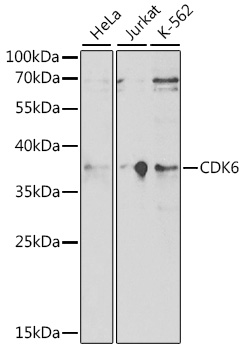
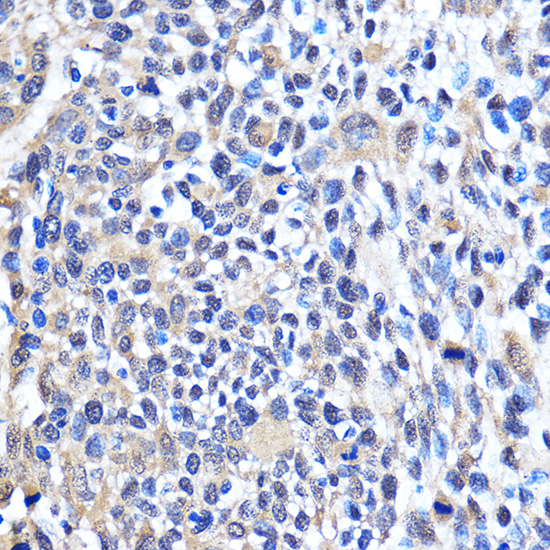
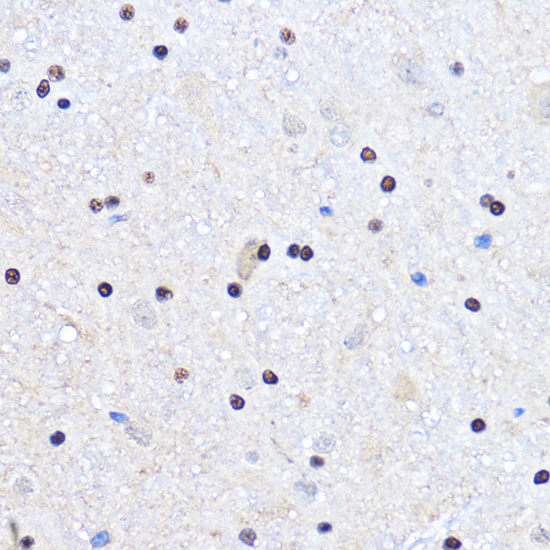
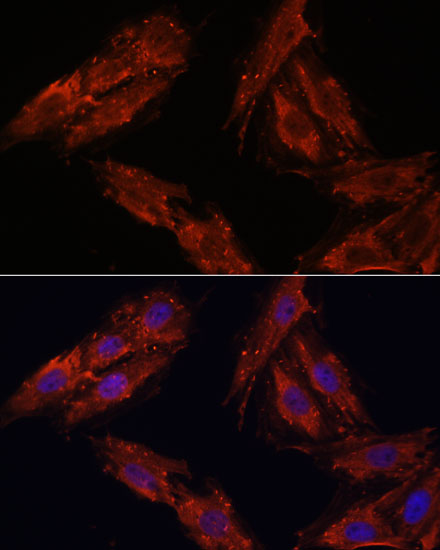
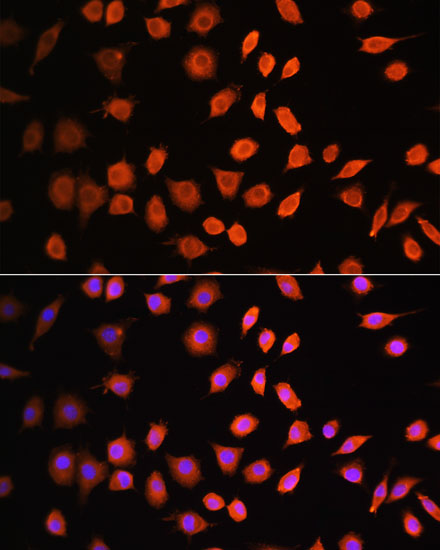
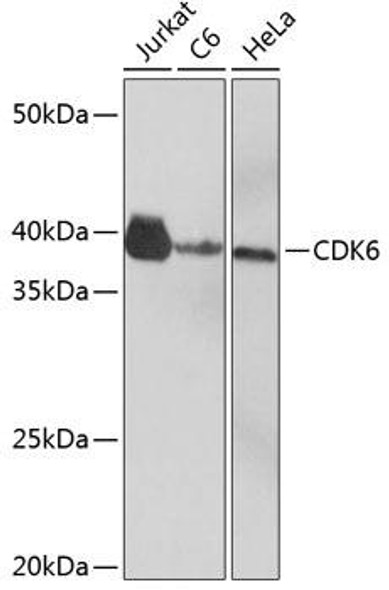
![Anti-CDK6 Antibody (CAB1545)[KO Validated] Anti-CDK6 Antibody (CAB1545)[KO Validated]](https://cdn11.bigcommerce.com/s-rd6ounxcu2/images/stencil/590x590/products/42748/47493/anti-cdk6-antibody-cab1545ko-validated__44245__70099.1706523018.jpg?c=1)


